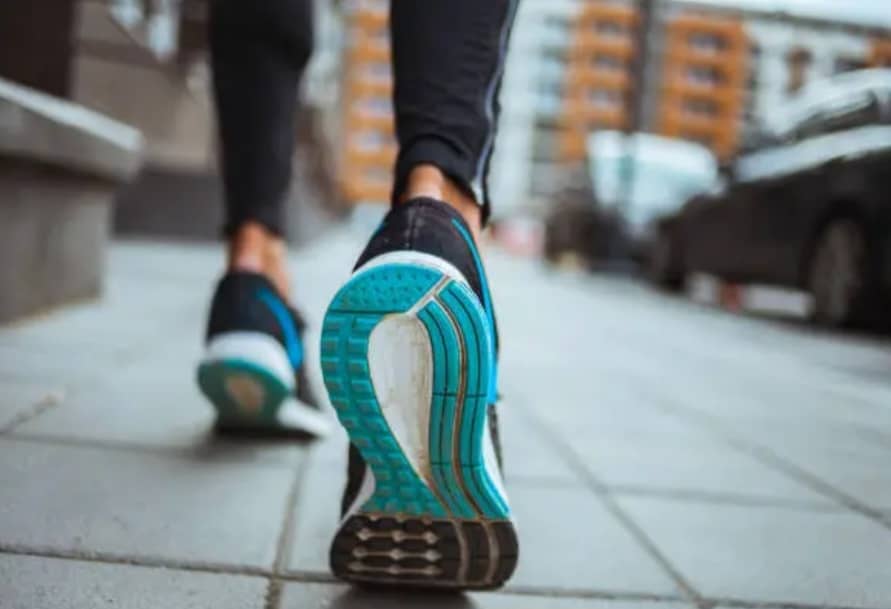Welcome to our blogpost on finding the perfect running shoes for walking! Whether you’re a dedicated walker or just starting out, choosing the right shoes is crucial for a comfortable and enjoyable walking experience.
By the end, you’ll have a clear understanding of why running shoes can be a great choice for your walking needs. So, let’s dive in and find the perfect pair of shoes to keep you moving with ease!
How Do Running Shoes and Walking Shoes Differ?
Running shoes and walking shoes differ in several key aspects. Firstly, running shoes are designed with extra cushioning to absorb the impact of running, while walking shoes prioritise stability and support.
Running shoes are typically more flexible to accommodate the foot’s natural movement during running, whereas walking shoes have a more rigid sole to provide stability during the heel-to-toe motion of walking.
Some time you face knee pain in your foot. Additionally, running shoes are lighter in weight and have more breathable materials to enhance speed and keep the feet cool, while walking shoes may have slightly more weight for added stability and durability.
The outsole of running shoes often has a more aggressive tread pattern for better traction on various surfaces, while walk shoes have a smoother outsole for reliable grip on even surfaces.
Lastly, running shoes may incorporate features like pronation control, while walking shoes may prioritise a wider toe box for added comfort during long walks. Ultimately, choosing between running shoes and walk shoes depends on individual needs and preferences.
Running Shoe Technology That Doesn’t Fit Walking
When it comes to walking, certain running shoe technologies may not be well-suited. One such technology is excessive cushioning, which is designed to absorb the impact of running but may feel bulky and hinder natural foot movement during walking.
Additionally, the high heel-to-toe drop found in running shoes, which promotes a forward-leaning posture, can disrupt the natural gait and cause discomfort or instability while walking.
Aggressive tread patterns, although beneficial for running on various surfaces, may create unnecessary friction and inefficiency when walking on even surfaces.
The lightweight construction of running shoes, while advantageous for speed, may not provide the stability and durability needed for walking. Lastly, pronation control features in running shoes may restrict the foot’s natural movement during walking and compromise comfort.
Therefore, it is advisable to choose shoes specifically designed for walking or those that strike a balance between cushioning, support, and flexibility to ensure optimal comfort and performance during walking activities.

Find a Walker for You, Not Somebody Else
Finding the right walker for yourself is a personal journey that should be tailored to your specific needs and preferences. It’s important to remember that what works for someone else may not work for you.
When choosing a walker, consider factors such as your mobility level, height, weight, and any specific requirements you may have.
Take the time to try out different models and styles to find the one that provides the best comfort, stability, and ease of use for you. Whether you need a standard walker, a rollator with wheels.
Or a specialised walker with additional features, prioritise your own comfort and safety. By finding a walker that suits your unique needs, you can enhance your mobility and independence. Making everyday tasks and activities more manageable and enjoyable.
Important Note: If you have any queries about shoes and for purchase purpose you can visit this site specialshoes.net
Find a Walker for You, Not Somebody Else
When it comes to choosing a walker. It’s crucial to find one that suits your individual needs instead of relying on what works for someone else. Everyone has different mobility requirements, so it’s important to consider factors like your height, weight, and specific needs.
Take the time to try out different walker models and styles to find the one that offers the best comfort, stability, and ease of use for you. Whether you need a standard walker, a rollator with wheels, or a specialised walker with additional features, prioritise your own comfort and safety.
By selecting a walker that is tailored to your unique needs, you can improve your mobility and independence, making daily tasks and activities more manageable and enjoyable.
Remember, finding the right walker for you is a personal journey, so don’t hesitate to seek professional advice and explore various options until you find the perfect fit.
Avoid Mistakes: Running Shoes vs. Walking Shoes
To avoid common mistakes when choosing between running shoes and walking shoes. It’s important to understand the key differences between the two. Firstly, running shoes are designed to provide extra cushioning and support for the high-impact nature of running.
While walking shoes prioritise stability and comfort for the repetitive motion of walking.
Secondly, running shoes are typically more flexible to accommodate the foot’s natural movement during running. Whereas walk shoes have a more rigid sole to provide stability during the heel-to-toe motion of walking.
Additionally, consider the weight and breathability of the shoes, as running shoes are lighter and more breathable for increased speed. While walk shoes may have slightly more weight for added stability.
Lastly, pay attention to the traction and outsole design, as running shoe often have a more aggressive tread pattern for varied surfaces. While walking shoes have a smoother outsole for even surfaces.
By understanding these differences, you can make an informed decision and choose the right footwear that suits your specific needs and activities.
Conclusion
Running shoes can be a great option for walking activities. Their cushioning, support, and flexibility make them suitable for providing comfort and reducing fatigue during walks. While there are differences between running shoe and walking shoe.
Such as cushioning levels and sole design, choosing the right running shoe can offer many benefits for walkers. Remember to consider factors like fit, durability, and traction when selecting running shoes for walking.
By prioritising comfort and support, you can enjoy a pleasant and enjoyable walking experience. So, lace up your running shoes and hit the pavement with confidence!
Frequently Asked Question
Q1. Can you use a running shoe for walking?
Ans: Yes, running shoes can be used for walking. While they are designed for different activities. Running shoes often provide the necessary cushioning, support, and comfort for walking as well. However, it’s important to consider individual preferences and needs when choosing footwear.
Q2. Can you wear running shoes for everyday use?
Ans: Yes, running shoes can be worn for everyday use. They are comfortable, supportive, and often have cushioning that can provide comfort during daily activities. However, it’s important to consider individual preferences and the specific needs of your daily routine.
Q3. Which footwear is best for walking?
Ans: The best footwear for walking depends on individual preferences and needs. Generally, walking shoes or sneakers specifically designed for walking provide the necessary support, cushioning, and stability. It’s important to choose footwear that fits well and offers comfort during long walks.
